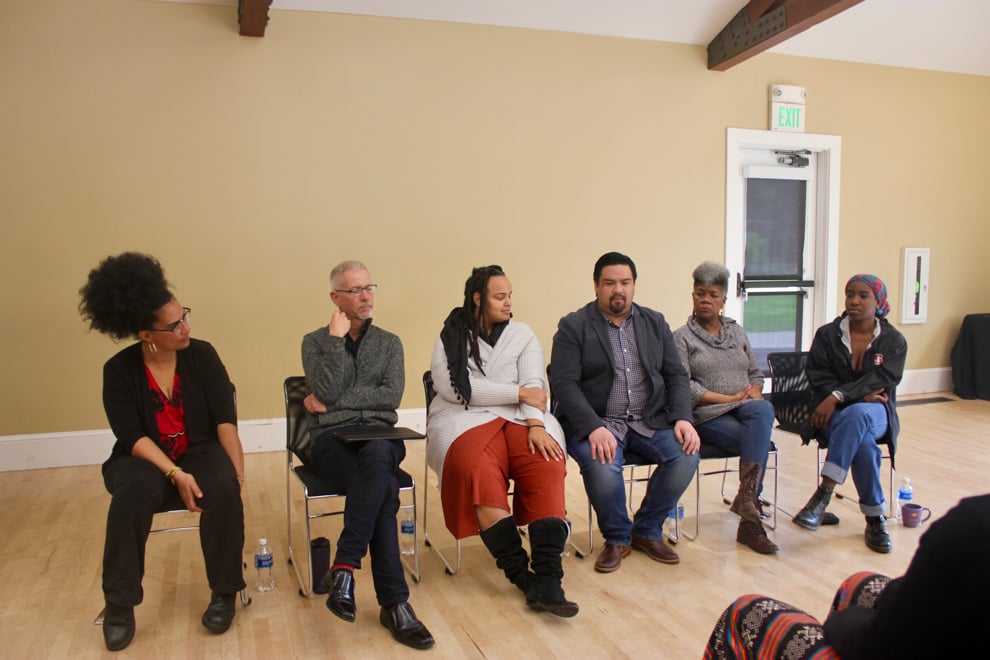Kathleen Tarr’s tear-stricken voice echoed throughout the Black Community Services Center as she spoke of her late friend, Jeff Adachi, a San Francisco public defender and Asian American filmmaker who passed away on Feb. 22.
“Jeff would no doubt tell us to cry if we want to, but pick up the mantle and continue to fight because the people who are suffering don’t have time to take a holiday,” Tarr said. “So fight we will.”
Adachi was set to be a panelist at Tarr’s fifth annual “Getting Played” symposium, in which panelists and attendees discussed how to fight for increased diversity and equity in the entertainment industry. Hosted by its founder Tarr, a lecturer in the Program in Writing and Rhetoric, Saturday’s event was headlined by Lili Bernard, one of more than 60 women to publicly accuse entertainer Bill Cosby of sexual assault.
“We are here today because the entertainment industry is what we all consume,” Tarr said. “It shapes us. There is no avoiding it.”
‘We matter too’
Bernard’s keynote speech discussed her experience as a victim of sexual assault and domestic abuse. As she spoke, she flipped through a slideshow containing pictures from her time as a guest star on The Cosby Show and Seinfeld in the ’90s.
“More than 30 percent of [publicly-known Cosby survivors] are black women,” Bernard said. “And we matter too.”
Making the decision to publicly accuse Cosby was not easy, Bernard said.
However, after encouragement from her son and other Cosby victims including Beverly Johnson, Bernard ultimately found the strength to come forward.
She also presented snapshots of confrontations outside of the courtroom, instigated by people whom she said she had reason to believe Cosby may have hired to verbally and physically attack her and the other survivors.
“They would go up to his PR people and pass notes to them,” Bernard told The Daily. “It appeared to be orchestrated.”
Several slides displayed art that Bernard drew during multiple hospitalizations for repeated suicide attempts, suicidal ideation and Grave’s disease, an autoimmune disorder. Art helped her “purge out the trauma” that the rape had imposed on her, she said.
Bernard concluded with pictures of her art studio, where she teaches students, and the art that she continues to create and share to raise awareness about sexual abuse.
‘A tool for social justice’
Bernard was later joined by a panel of speakers who work in the entertainment industry: Brad Erickson, A-lan Holt and Jeffrey Lo, along with BLACKstage vice president Danielle Stagger ’19.
The panelists discussed how inequality in the industry has affected their day-to-day life, arguing that artists’ talents and messages are being overshadowed by industry logistics like funding and production.
“From a historical point of view, we are living in a moment where culture is privatized,” Holt said. “If you don’t have the private needs to fund your project, then your project doesn’t deserve to be seen. Clearly, that is not the case. Art is not just a tool for power or privilege and violence — it is a tool for social justice.”
According to Erickson, efforts to make the entertainment industry more equitable are increasing.
“[There is] a commitment to making change happen that I haven’t seen in my 16 years [at this job],” he said. “That does make me hopeful that change can come. It is not easy. It is hard work.”
However, the panelists unanimously agreed that up-and-coming artists and entertainers lack funding, with Holt arguing that people of color specifically are “underfund[ed] and defund[ed].”
In the wake of the recent Academy Awards, which saw an increase in inclusivity of people of color, panelists highlighted the success of box office hits “Crazy Rich Asians” and “Black Panther.”
Although “Crazy Rich Asians” received criticism for giving a romantic and cliche storyline to the first majority-Asian film cast since 1993, Lo defended the film by arguing that “any community has the right to create a fluffy, romantic comedy that is going to make people happy.”
“I don’t want every Asian American movie to be about Asian American life,” Lo added.
Stagger pointed to problems with the lack of diversity in the Academy, which she described as “overwhelmingly made up of wealthy white men.”
“What’s tough is for the award to be: do wealthy white men like your content or is your content good?” Stagger pointed out. “People of color should get a chance to make bad movies. Every theatre piece with a predominantly black cast doesn’t have to be the next Black Panther.”
For students who are hoping to make the next Black Panther, though, Smallwood stressed that they be exposed to both the glittering facade and the gritty underside of filmmaking.
“One problem is [that] these kids see the end result — they see the glamour, the accolades,” Smallwood said. “They don’t see these people who have to pump gas or wash dishes first and kept at it in their heart to get that end result. It’s up to us to encourage them [to see] the real-life story [about] how they struggled.”
Contact Yusra Arub at yusraarub19 ‘at’ mittymonarch.com.
This article has been updated to correct factual inaccuracies regarding the criminal case against Bill Cosby. The Daily regrets these errors.
